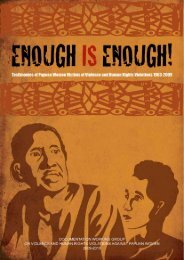The Impact of Armed Conflict on Women and Girls - UNFPA
The Impact of Armed Conflict on Women and Girls - UNFPA
The Impact of Armed Conflict on Women and Girls - UNFPA
Create successful ePaper yourself
Turn your PDF publications into a flip-book with our unique Google optimized e-Paper software.
Support from the Internati<strong>on</strong>al Community<br />
Few <str<strong>on</strong>g>of</str<strong>on</strong>g> the internati<strong>on</strong>al NGOs that deal with violence have remained in<br />
Bosnia <strong>and</strong> Herzegovina. One excepti<strong>on</strong> is the Internati<strong>on</strong>al Rescue Committee<br />
(IRC). From the beginning, a good programme <strong>on</strong> reproductive health included<br />
protocols for dealing with issues <str<strong>on</strong>g>of</str<strong>on</strong>g> violence. IRC set up the SOS teleph<strong>on</strong>e<br />
service in Gorazde, <strong>and</strong> through the local women’s NGO, Anima, has assisted<br />
the community in awareness <str<strong>on</strong>g>of</str<strong>on</strong>g> reproductive health <strong>and</strong> the necessity <str<strong>on</strong>g>of</str<strong>on</strong>g> highquality<br />
health services. IRC addressed issues <str<strong>on</strong>g>of</str<strong>on</strong>g> violence against women from<br />
the outset. IRC practice is recognized by its grass-roots approach to develop<br />
networks am<strong>on</strong>g women’s NGOs <strong>and</strong> to include resp<strong>on</strong>sible community<br />
members in programme implementati<strong>on</strong>. IRC has also fostered rec<strong>on</strong>ciliati<strong>on</strong><br />
between different ethnic groups through its educati<strong>on</strong>al programmes in<br />
reproductive health.<br />
<str<strong>on</strong>g>The</str<strong>on</strong>g> Internati<strong>on</strong>al Police Task Force (IPTF) is not focused <strong>on</strong> domestic<br />
violence. However, it has initiated certain acti<strong>on</strong>s to do so. IPTF Public Affairs<br />
Officers c<strong>on</strong>ducted a domestic violence campaign in June 2001.<br />
Local police are encouraged to deal with violence <strong>and</strong> to improve their<br />
attitudes towards the victims. <strong>Women</strong> have been encouraged to take part. Each<br />
police stati<strong>on</strong> has local women present who are trained in domestic violence<br />
issues. A six-m<strong>on</strong>th follow-up provides some data <strong>on</strong> the incidence <strong>and</strong><br />
prevalence <str<strong>on</strong>g>of</str<strong>on</strong>g> violence. In each <str<strong>on</strong>g>of</str<strong>on</strong>g> the seven regi<strong>on</strong>s <str<strong>on</strong>g>of</str<strong>on</strong>g> Bosnia <strong>and</strong> Herzegovina,<br />
<strong>on</strong> average two cases are reported m<strong>on</strong>thly (14 cases m<strong>on</strong>thly across the<br />
country). An IPTF <str<strong>on</strong>g>of</str<strong>on</strong>g>ficer noted that domestic violence was underreported.<br />
C<strong>on</strong>centrati<strong>on</strong> Camp Violence<br />
A comm<strong>on</strong> practice in c<strong>on</strong>centrati<strong>on</strong> camps is to force male pris<strong>on</strong>ers to<br />
sexually assault, rape or humiliate <strong>on</strong>e another. In additi<strong>on</strong>, the c<strong>on</strong>trolling<br />
army’s soldiers rape women. Violence is used as a tool to c<strong>on</strong>trol the enemy’s<br />
civilian populati<strong>on</strong>, indirectly to humiliate the enemy’s army <strong>and</strong> furthermore to<br />
destroy their communities. From a sociological point <str<strong>on</strong>g>of</str<strong>on</strong>g> view, violence in<br />
c<strong>on</strong>centrati<strong>on</strong> camps is a direct assault <strong>on</strong> an individual’s body <strong>and</strong> self, the<br />
motivati<strong>on</strong> being to “destroy community <strong>and</strong> demolish the social order up<strong>on</strong><br />
which the community had thrived for centuries.” 19 In Bosnia <strong>and</strong> Herzegovina,<br />
sadistic rape camps were c<strong>on</strong>structed with the aim <str<strong>on</strong>g>of</str<strong>on</strong>g> shredding the social fabric<br />
<str<strong>on</strong>g>of</str<strong>on</strong>g> society.<br />
<str<strong>on</strong>g>The</str<strong>on</strong>g> mass rape <str<strong>on</strong>g>of</str<strong>on</strong>g> women <strong>and</strong> young girls during the war was not a<br />
c<strong>on</strong>sequence <str<strong>on</strong>g>of</str<strong>on</strong>g> the warfare but a design to destroy families <strong>and</strong> erode<br />
19 K. Doubt, Sociology after Bosnia <strong>and</strong> Kosova (New York, Lanham, Boulder; Oxford, Rowman &<br />
Littlefield Publishers, Inc., 2000) p. 2.<br />
70




![IANSA [PDF, 2MB] - PeaceWomen](https://img.yumpu.com/25206379/1/190x123/iansa-pdf-2mb-peacewomen.jpg?quality=85)
![Commitments Sample [PDF, 93KB] - PeaceWomen](https://img.yumpu.com/25206331/1/190x245/commitments-sample-pdf-93kb-peacewomen.jpg?quality=85)










![A Toolkit for Advocacy and Action [PDF, 260KB] - Peace Women](https://img.yumpu.com/25205989/1/190x245/a-toolkit-for-advocacy-and-action-pdf-260kb-peace-women.jpg?quality=85)